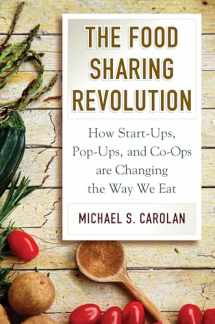
The Food Sharing Revolution: How Start-Ups, Pop-Ups, and Co-Ops are Changing the Way We Eat
Book details
Summary
Description
Marvin is a contract hog farmer in Iowa. He owns his land, his barn, his tractor, and his animal crates. He has seen profits drop steadily for the last twenty years and feels trapped. Josh is a dairy farmer on a cooperative in Massachusetts. He doesn’t own his cows, his land, his seed, or even all of his equipment. Josh has a healthy income and feels like he’s made it.
In The Food Sharing Revolution, Michael Carolan tells the stories of traditional producers like Marvin, who are being squeezed by big agribusiness, and entrepreneurs like Josh, who are bucking the corporate food system. The difference is Josh has eschewed the burdens of individual ownership and is tapping into the sharing economy.
Josh and many others are sharing tractors, seeds, kitchen space, their homes, and their cultures. They are business owners like Dorothy, who opened her bakery with the help of a no-interest, crowd-sourced loan. They are chefs like Camilla, who introduces diners to her native Colombian cuisine through peer-to-peer meal sharing. Their success is not only good for aspiring producers, but for everyone who wants an alternative to monocrops and processed foods.
The key to successful sharing, Carolan shows, is actually sharing. He warns that food, just like taxis or hotels, can be co-opted by moneyed interests. But when collaboration is genuine, the sharing economy can offer both producers and eaters freedom, even sovereignty. The result is a healthier, more sustainable, and more ethical way to eat.


We would LOVE it if you could help us and other readers by reviewing the book
Book review



